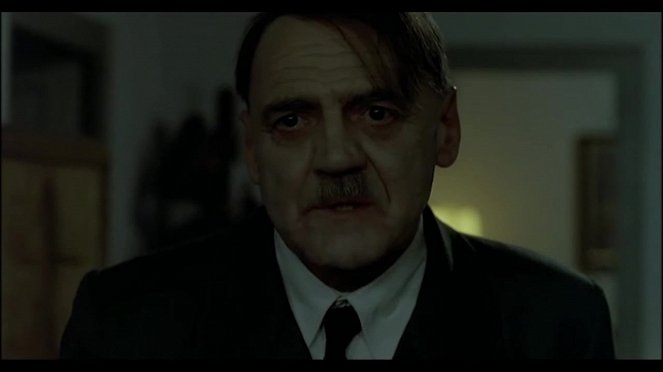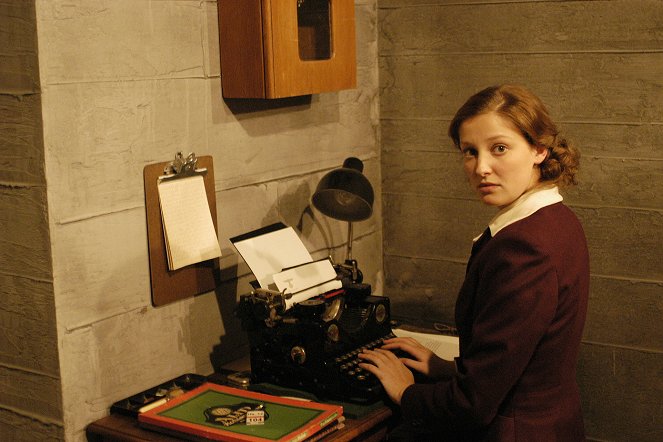Reżyseria:
Oliver HirschbiegelScenariusz:
Bernd EichingerZdjęcia:
Rainer KlausmannMuzyka:
Stephan ZachariasObsada:
Bruno Ganz, Alexandra Maria Lara, Corinna Harfouch, Ulrich Matthes, Juliane Köhler, Heino Ferch, Christian Berkel, Matthias Habich, Thomas Kretschmann (więcej)Opisy(1)
Berlin, kwiecień 1945 roku. Na ulicach panuje chaos nie do opisania. Naród niemiecki czeka na swą nieuchronną klęskę. Adolf Hitler wraz ze swoimi najbliższymi współpracownikami ukrywa się w bunkrze w podziemiach Kancelarii Rzeszy. Wśród "świty" wodza znajduje się Traudl Junge, ostatnia sekretarka Hitlera. To jej wspomnienia posłużyły do przedstawienia ostatnich, spędzonych w izolacji, dwunastu dni życia wodza upadającej III Rzeszy. Te dramatyczne dni wzbudzają tak wiele kontrowersji i domysłów jak żaden inny etap biografii Hitlera. Co naprawdę wydarzyło się 10 metrów pod ulicami Berlina? (Monolith)
(więcej)Materiały wideo (3)
Recenzje (10)
A movie that seems more like a documentary that isn’t so much about Hitler’s last days, as about the people around him and his last atrocity committed on his own nation. Certainly worth watching, but if it hadn’t been made by Germans, it would never have caused such a stir (is it really making Hitler seem more human if he thanks his cook for his food?). Even so, it’s good that it was the Germans who filmed it; they need to chase the skeletons out of their closet.
()
The roaring protagonist Ganz may look like Hitler, but that's not enough for a good movie. After the first half hour, all the dramatic unrest or sadness of the supporting characters starts to play out lightly, and the final catharsis doesn't have time to fix anything. In the end, the war film crystallizes into a dramatic journey through the history of Germany, accompanied by confused editing and a sense of a (non)eventful film that was only talked about from a thematic standpoint.
()
The only negative of the film Downfall is its formal aspects. This is not a key and fatal negative, as some "I always have to write something different than the others" reviewers try to prove in their analyses. The director and screenwriters chose as the main narrative perspective "documentary distance" from the story and, adversely, a very expressive approach to the atmosphere. As a result, the dialogues have a austere and non-stylish feel, while the suffocating atmosphere of the bunker is abundantly and impressively complemented by sound effects (silence vs. rumbling), a camera (which sticks to the characters and promotes a claustrophobic and hopeless feeling) and editing (combining the illusion of interiors with naturalism in exteriors). While the expressive component of the film works perfectly, the documentary aspects tend to slip into excessive semi-pathos, multi-wording, and boringly branched dialogues, which, with a certain repetitiveness, take away momentum from the film. Not fatally, of course. The introduction of a "secondary" narrator in the form of Traudl Jung also proved very useful, who mediates a civilian view of the icons of the Third Reich - a civilian view which, in its naivety and blindness, is perhaps the most tragic feature of the film. And Jung's documentary suffix only points him out in all his nudity "...I should have been more interested..." A chilling finish of one of the storylines. But "Downfall" has more storylines, and it must be admitted that director Oliver Hirschbiegel was able to portray them all with certainty and persuasiveness. The result is a film with a raw atmosphere, teasing with questions (which the viewer has to answer for himself), and it is oppressive in that it does not hide anything with the poor decoys of heroic pathos. German cinema successfully passed the state exam in post-war adulthood...
()
For a person who is not interested in history and confuses Husák with Hitler, it is certainly a meritorious and interesting piece of work, but for someone with an interest in history, it is a modest account that does not bring any fundamental new information and not even the controversial view of one human being that is so much proclaimed in the press. In any case, the performances were excellent, including Bruno Ganz, whose role was tempting to overact, which fortunately did not happen. Overall, I would see it as a three and a half stars, rounded down this time due to the high expectations.
()
I have never experienced such a quiet audience during the closing credits in a multiplex. Downfall is a modest masterpiece, powerful mainly due to the content that it reconstructs and by the gravity of the events that it depicts. In terms of imagery, it is a theatrically austere interior affair relying on the most realistic possible design of the sets and on the performances of the actors, who are exceptional. Not only Bruno Ganz, but also the other protagonists display maximum commitment to their work. The well-cast faces of Joseph and Magda Goebbels, whose cold-bloodedness and unhealthy devotion to the Führer almost surpass the terrible expression of Hitler’s demonic personality. Goebbels’s cold-eyed expression will haunt me for quite some time. Among other things, the film provokes the thought of what the world might look like if Hitler had succeeded in his plan. The scene in which he makes a visionary speech as he walks alongside a mock-up of the center of the Third Reich’s capital is one of the film’s best.
()



Reklama